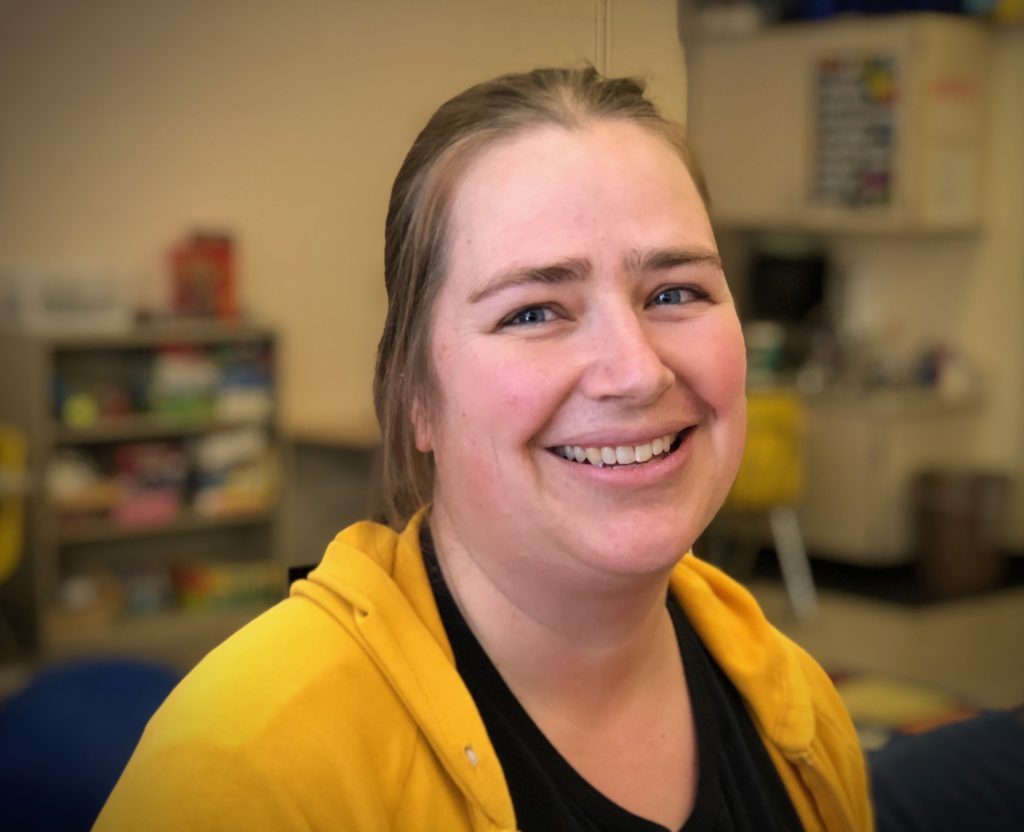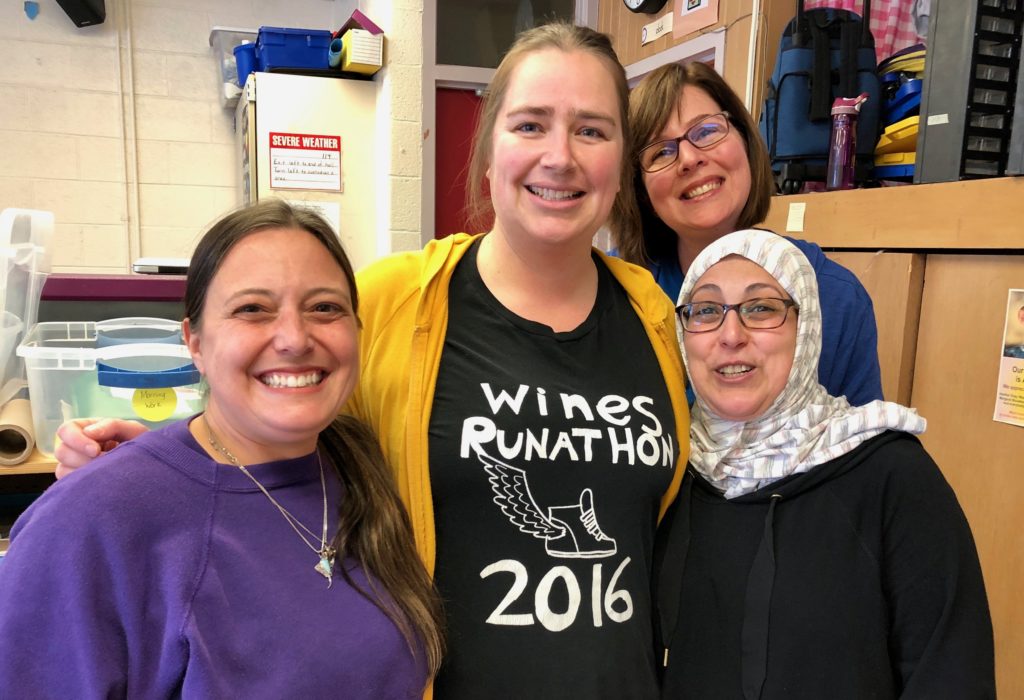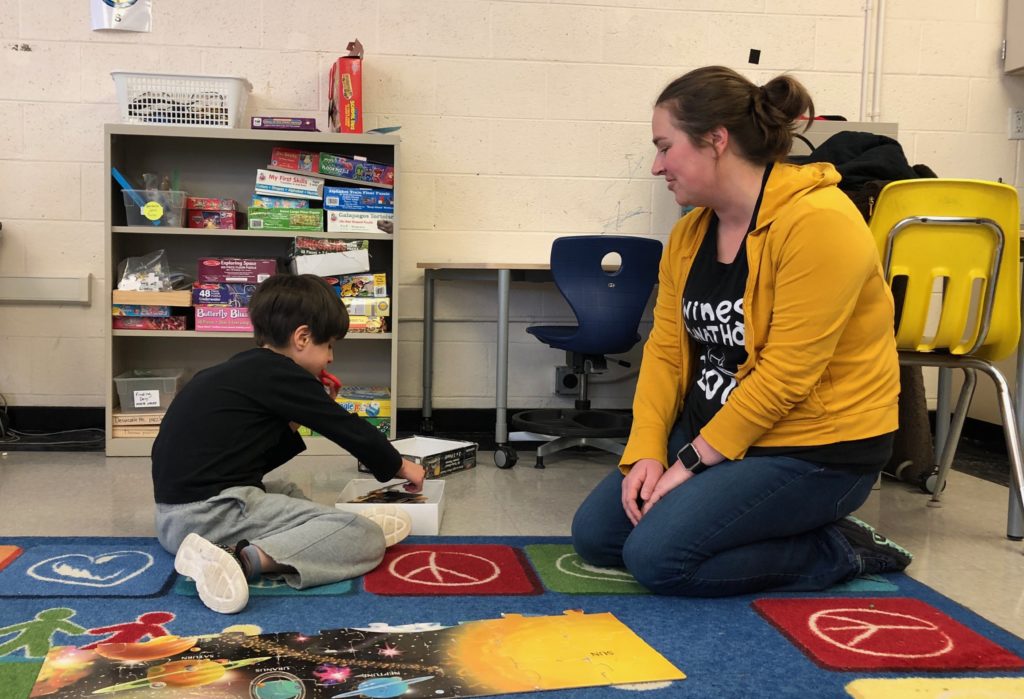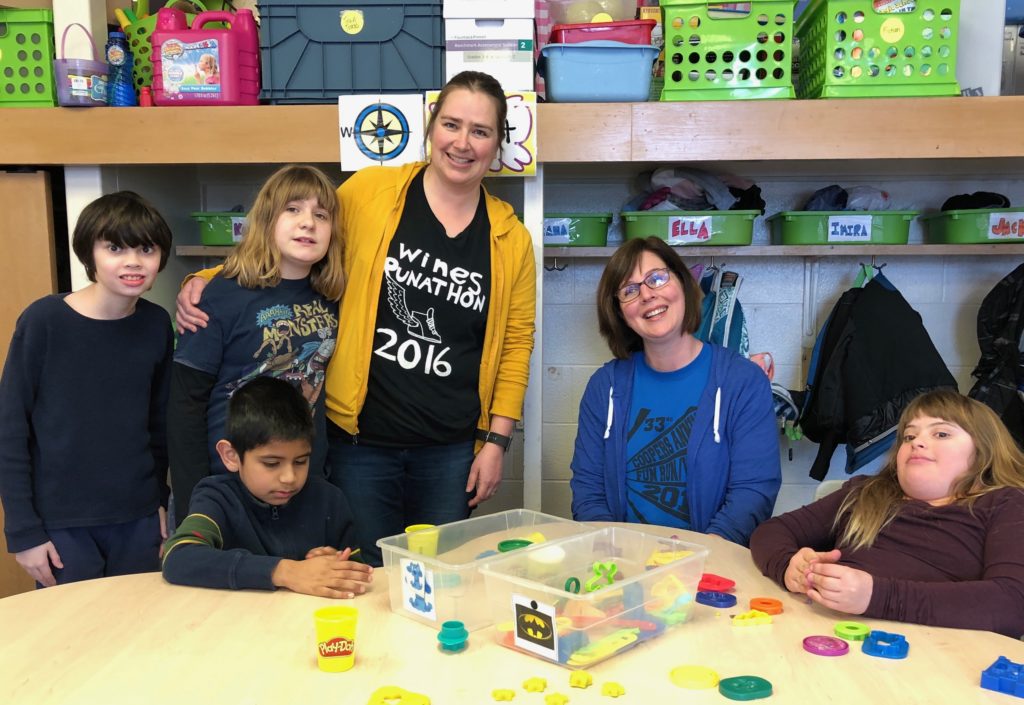

By Jo Mathis/AAPS District News Editor
Heather Gray grew up with a brother and sister in the small town of Jesup, Iowa. Her parents were both elementary school teachers and she was a teacher’s kid, attending the school where her father taught. She graduated from the University of Northern Iowa with a degree in Special Education: Moderate, Severe/Profound Disabilities, then moved to Chapel Hill, N.C. to teach a high school self-contained classroom for adolescents with autism for two and a half years. She then spent a year outside of Boston, studying applied behavior analysis and teaching at a private school for students with autism. Following a year off of teaching, she moved to the Ann Arbor area and has now been teaching in AAPS for 13 years. She earned her master’s degree in Autism Spectrum Disorders from Eastern Michigan University.
Gray spent six years in a CI classroom at Logan and then moved to Wines where she teaches a CI classroom for students with autism and cognitive impairments. Valerie Mates—whose son, Corbin, is in Gray’s small special ed classroom at Wines—says Corbin has a caring, responsible and thoughtful team of teachers, aides, and therapists. Mates says Gray is especially amazing, and adds that she is kind, thoughtful, patient, communicates well, and always looking for more ways to reach a diverse collection of students.
Gray lives in Ypsilanti with her husband Drue and their three boys, Elliot, Oliver, and Linus. Elliot and Oliver are in third grade and kindergarten at Wines, and Linus will most likely be at Wines in Young Fives next year. She says she loves having her boys with her at Wines and is involved in their elementary school experience as much as she can.
What inspired you to become a teacher? Why special ed? In middle school, I regularly babysat a young boy with Down syndrome and experienced my first broken heart when his family moved across the state a few years later. I watched a video his teachers had prepared to send ahead to his new school and was amazed at what he was capable of doing. I wondered how his teachers had taught him to do those things. I was never dead set on teaching but knew I wanted to work with adults and children with special needs in some capacity. During college, I worked at two summer camps for individuals with special needs. Camp was an ideal training ground. I learned to focus on what people could do instead of what they couldn’t do. I like to think that philosophy informs what happens in our classroom every day. Find strengths and build on them.
What would surprise people about the work of a special ed teacher at AAPS? Collaboration is common in teaching these days, but this is especially true of a self-contained teacher. I work with amazing teaching assistants, without whom, our classroom would just stop functioning. They play a critical role in not only education but keeping everyone safe. Many other professionals including speech and language pathologists, occupational therapists, physical therapists, social workers, general education grade level teachers, and our specials teachers pour their hearts into working with our kids in these programs across the district every day.
What’s the best compliment anyone could give you? I consider it a compliment every day that our families trust our team enough to send their children and know that we will keep them safe. As parents of children with significant communication challenges, it must be a leap of faith to put your child on a bus and send them off to school. I don’t take that trust for granted.
In your 13 years in AAPS, what’s the most important thing you’ve learned about teaching? About learning? Teaching is about not giving up… never saying never.
As for learning, I couldn’t have this job if I didn’t believe that all children were capable of learning. Every child follows their own trajectory and path. Sometimes our kids don’t learn as much or as quickly as myself, their families, or the state standards want them to. Sometimes that learning doesn’t show up in the ways that we are supposed to test for it. I encourage families to only measure their child against him or herself, instead of against a statistic or a percentile. Is she/he making progress? Let’s keep moving in that direction.

Describe an average workday. I try to get to school around 8:00 so I can set up the day’s schedule and get any materials ready to go for the day. As the teacher assistants arrive, I fill them in on any scheduling changes for the day and any relevant information I’ve received from parents that might impact the day. Once the kids arrive they check their schedules, and the day begins. Our day includes reading, writing, and math instruction. We have specials classes, including PE, art, library, and music. Most kids also spend time in their general education classrooms daily in addition to general education specials classes, and sessions with our speech and language pathologist, occupational therapist, and social worker. It’s busy, and not perfect, but most days flow pretty well. At the end of the day, I do a little prep work for the next day’s schedule and head home with my boys.
What advice would you give to a first-year teacher? For a first-year self-contained teacher, I would tell him or her that the first year is really difficult. Even if you are working really hard, it will still feel like you are trying to keep your head above water. This feeling will never go away completely, but it does get easier. Do the best you can with the information and knowledge you have now, and when you learn or figure out a better way, do it.
What was always written on your report card in grade school? I was pretty good at “doing school.” Most of the comments were that I was a dependable, hard-working student. My dad was right down the hallway teaching, so my siblings and I couldn’t really get away with many shenanigans at school.

What’s the happiest part of your day? I’m generally happy whenever everyone is following their schedule, using their words to access what they need, and engaged in learning, whatever time of day that happens to be. I love it when the classroom is running smoothly.
Favorite websites: teacherspayteachers.com.
Apps you can’t live without: In our classroom, we love Seesaw, Todo Math, Word Wagon, Emotions, and youtube kids.
What makes teaching at Wines unique? I hope this takes place at other schools, but I’m very thankful to be working in a building with adults who are really flexible with our kids’ unique needs and willing to let us teach independence. Whenever I need help, someone is there.
What do you know about teaching now that you wish you’d known that first year? So much! I loved my first classroom in North Carolina. The families were so supportive and forgiving of me as a new teacher who showed up every day and tried really hard. I cared for their students so much and the love and effort I put in turned out to be more important to those families than any skill I was trying to teach. I do wish that I’d had a better understanding of the principles of behavior, and that is ultimately why I left my first job. I needed to learn more.
How do you keep students engaged? We keep students engaged by running a highly structured, predictable classroom. It’s critical for our students to know what’s going to happen throughout our day. Within the structure, we have built-in flexibility that allows us to accomplish what we need to. Our kids know what to expect when they arrive, and that provides stability and increases the likelihood of engagement throughout the day. Our students know that they are loved and appreciated for who they are, even on challenging days.
What is the most rewarding part of teaching? I have the same students for three, sometimes four years. Most of them I’ve known since kindergarten as they’ve been in our K-2 class here at Wines. We get to really invest in our kids and see not only academic growth—but growth in social and communication skills as well. I love running into former students at events across the year and seeing their growth in independence, especially.
What do you wish everyone realized about the work of a teacher? Teaching is very personal. It’s very hard to leave work at work. Not many other professions exist where you are regularly losing sleep over someone else’s child.
How do you recharge? Taco Tuesdays with my classroom staff, trying to get enough sleep, spending time with my husband and sons, reading, etc.

How do you spend your summers? I have spent part of the last two summers working on a curriculum committee for elementary self-contained special education classrooms. I also enjoy the time home with my boys, going to the pool, camping, and visiting our families since we are several states away from them all.
What’s most exciting about your professional life right now? Your personal life? Professionally, I work with a really great team. We smile and have fun on the good days and the hard days. The kids are learning and growing. In my personal life, I’m excited that after so many years, Michigan finally feels like our home.

Be the first to comment